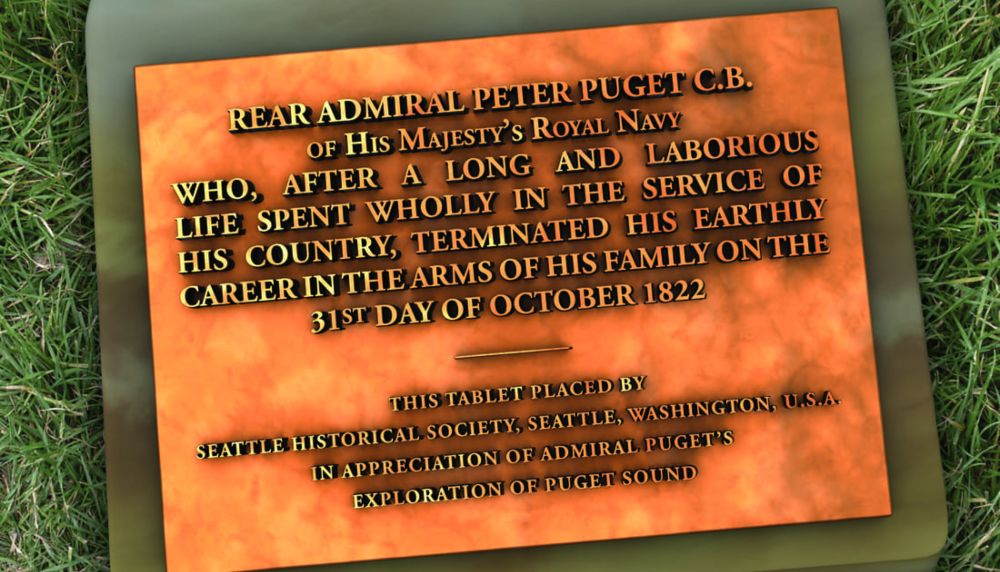The name “Puget Sound” may be one of our region’s most familiar terms, one that is hoisted, boosted, identified, and misspelled with abandon. Like all geographic names it has interesting origins.
British subject Peter Puget (1765-1822) entered His Majesty’s Navy as a 12-year-old midshipman on August 1, 1778. The French name, Puget, stems from Huguenot ancestors who fled France. Puget’s father John was a merchant and banker who died two years after Peter was born, leaving two sons and three daughters. Peter joined Captain George Vancouver in November 1790 for a voyage “Round the World.” Later sailings saw the young man drop anchor in Lisbon, the coast of France, ports in the North Sea and at Madras, India. At his 1822 death in Bath, he held the rank of Rear-Admiral of the Blue. Very little personal information has survived about Puget, although we know that his wife was named Hannah Elrington, and his mother was Esther. Peter and Hannah produced seven sons and four daughters.
Captain Vancouver recognized Puget’s talents as a surveyor and dependable adjutant. For example, Vancouver dispatched Puget and another able officer, Joseph Whidbey, to “proceed, with a supply of provisions for a week, to the examination of that branch of the Inlet leading to the south-westward.” In May 1792, while the sloop “Discovery” lay at anchor off Restoration Point on Bainbridge Island, Captain Vancouver and Lt. Joseph Baker in the ship’s yawl traveled the passage east to Vashon Island.
The launch and cutter under Puget’s command sailed south along the west channel. Vancouver’s log states: “Thus by our joint efforts, we have completely explored every turning of this extensive inlet, and to commemorate Mr. Puget’s exertions, the southern extremity I named Puget’s Sound.” That “branch” originally covered only the southern portion, south of Tacoma narrows. The northern half Vancouver called “Admiralty Inlet.” Vancouver, Puget, Whidbey, Baker and others on that voyage saw, in Vancouver’s words: “Innumerable pleasing landscapes, and . . . abundant fertility that unassisted nature puts forth.”
Natives called our great Sound “Whulge.” That term is an anglicization of the Lushootseed name for “sea, salt water, ocean, or sound.” Its bays, inlets, rocky shores, clam-rich tideflats, and hundreds of streams were sources of life, wealth, security, entertainment and myth to the first human inhabitants.
The geological backstory of Puget Sound rivals Vancouver’s later ruminations in drama and scope. The great sea itself emerged from continental ice sheets that repeatedly advanced and retreated in the Pacific Northwest. During the last freezing inundation – about 15,000 years ago – a lobe of the sheet (often called “Vashon”) spread south, shaping what we see today. The Sound’s waters include Hood Canal, Admiralty Inlet, Possession Sound, and Saratoga Passage. Our rich basin or trough is 80 miles long, eight miles wide, and can reach 900 feet in depth.
Visitors – and local residents – often refer to the Sound as an “Inland Sea.” Writer Archie Binns named it “Sea in the Forest.” Robert Walkinshaw, in his 1929 tract “On Puget Sound,” described it as “The Blue Green Country.” In 1966, Time Magazine described the commercial activity around our Sound as “Pugetopolis.” Writer Gordon Newell once stretched his definition of Puget Sound to include “the entire waterway, from Cape Flattery to Olympia.”
Maintaining historic perspective, I choose the watery reach of Peter Puget himself: “The land in the southern inlets of these strates is most grateful to the eye.”

Very enjoyable piece on Puget Sound. Thank you.